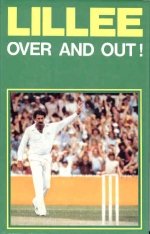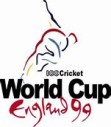A look back at Dennis Lillee
Marco Trevisiol |
Dennis Lillee wrote ‘Over and Out’ only months after his retirement in 1984. It is not an autobiography as such (as he had already done one earlier in the decade) but more a summation of the last couple years of his career mixed with observations on the state of the game and players he played with and against.
It was a fascinating book to go through when I first read it a couple of decades ago and it is even more fascinating to read now. That is partly because after books by Australian cricketers in recent years being full of fluff and blandness one can better appreciate the frank and forthright views Lillee expresses. And partly because it sheds an invaluable light on Australian cricket in the mid-1980s.
The 1980s era of Australian cricket has been given fresh emphasis recently with the release of ‘Golden Boy’ by Christian Ryan which is both biography of former captain Kim Hughes and an analysis of the culture of Australian cricket in the 1980s. It is a fine work on what has been an overlooked period in Australian cricket history (this was the first biography done on Hughes). It gained some media attention for its exposure of the rift between Hughes (perceived as the golden boy of the Australian cricket establishment) and many of the leading World Series Cricket ‘rebels’, particularly Lillee and Rod Marsh.
While ‘Golden Boy’ is a fine and insightful work, the friction between Hughes and senior teammates like Lillee was on the public record for years… and ‘Over and Out’ is one of the best documents of that.
While Lillee is charitable to Hughes in some regards, on his captaincy he has very little positive to say and is blunt and detailed in his criticisms. In the current era where you can read half a dozen books by Australian cricketers with barely a criticism ever aired of a teammate, Lillee’s observations are still quite striking to read 25 years on.
For example, on Hughes’s ability (or lack of) to listen to other members of the side:
The thing that irked me most was that the bloke wouldn’t listen. For some reason or other he thought he knew better and this attitude led to some bitter conflict. Certainly, I had very little respect for him and I wasn’t Robinson Crusoe in that regard.
Or Hughes’s apparent back-stabbing nature:
I lost count of the stories that got back to me from several different sources that I was washed up; one story even went that I was supposed to have ‘gone missing’ for three days. Absolute bull****! The worrying thing was that the source of these allegations always got back to Kim Hughes.
There are many more aspects that Lillee is critical of Hughes as captain. Indeed Lillee devotes a whole chapter to him entitled ‘The Hughes Saga’. It makes for great reading but one can’t help thinking how such public criticism from a revered former great would have undermined Hughes’s authority as captain (he was to resign from the captaincy in late 1984). It seemed to reflect an era of individualism and factionalism within Australian cricket in this era that led to underachievement in team performances, leading to the period in the mid-1980s where Australian cricket was arguably at its lowest ebb. One can summarise that while World Series Cricket lasted only two seasons, the rifts, bitterness and divisiveness were not fully healed until the late 1980s (in part because the main protagonists from that era had departed the playing arena).
Apart from his criticism of Hughes, there is much to savour in Lillee’s book. I was particularly struck by his assessment on Greg Chappell as captain. While generally positive of his leadership skills, he makes criticisms that he could be an overly harsh taskmaster, be aloof and had a “schoolmasterish” tone. It almost reads like a warning to the Indian cricket authorities of the pitfalls of appointing him as coach.
But his most interesting revelation about his relationship with Chappell is how a dispute with him over how he was being used as a bowler in a Test against the West Indies in 1975/76 led him for a period of time during the match to deliberately bowl badly!
While he also displays strong criticism of others in the book (including Geoff Boycott and Glenn Turner) he also displays passionate affirmation for some of his favourite teammates, opponents and journalists. Considering this was written in the middle of the an era of dominance by the West Indies, it is not surprising that he rates Viv Richards and Andy Roberts as the best batsman and bowler respectively he has played against. Particularly memorable is his summation of famous Australian cricket writer Ray Robinson:
In all my time as a cricketer, I don’t think there has been a more respected of better-liked journo. He was just a brilliant bloke. He wrote many, many books, and spent time in newspapers writing for many different publications around the world on the game he loved… Anyboy associated with cricket will know that Ray ‘Sugar’ Robinson passed away on July 6, 1982. So long mate, it was a pleasure to know you.
His observations on the direction the media was headed appear a dead-on assessment on the way the mass media treats cricket in the present day:
The way things are going, newspapers are going to need a ‘Turmoil Page’. You know… a page somewhere near the sports section, but not exactly in it. Here, the police roundsman could report the sport-related drug stories, the social writer could cover the sport’s sex scandals, the legal specialist could keep readers abreast of the court cases involving sportsmen and the industrial roundsman could do a daily round-up of which sportsmen were on strike and for what reason.
Lillee also devotes a chapter to his mate Rod Marsh where surprisingly he reveals that initially they were not close as they were such opposites (Marsh was a university graduate while Lillee dropped out of high school) and only when they toured for Australia together did they really gel. He also devotes an admiring chapter to Marsh’s effort to drink 45 cans of beer on the flight to England for the 1983 World Cup… how times have changed when one looks at how Australia treated Andrew Symonds a couple of months back.
The area where Lillee’s predictions are proven to be the off the mark are in the final chapter of the book where he speculates about his future and concludes with “The one thing certain is that I won’t be playing cricket.” Yet just over 3 years later he was back playing cricket for Tasmania for a season, as well as playing a one-day match at Lilac Hill every season against a touring side right up till the end of the 1990s.
Overall, this is a fascinating read which in its own way highlights the state of Australian cricket in the 1980s as much as ‘Golden Boy’ does. If you can find a copy somewhere, it is highly recommended.





Leave a comment